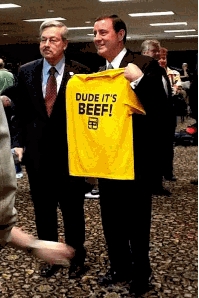Communications Around the "Pink Slime" Beef Additive
Parties on both sides of the "pink slime" debate are weighing in. For business communication students, perhaps the most interesting communications (so far) are around how the term became popular and how companies-both consumer companies and the manufacturer-are responding.
Blame Email
Oh, Email, you time-waster, career-destroyer, is there no end to the trouble you can start? In 2002, Gerald Zirnstein, a microbiologist at the U.S. Department of Agriculture, sent an email to colleagues saying "I do not consider the stuff to be ground beef, and I consider allowing it in ground beef to be a form of fraudulent labeling." Zirnstein is credited with coining the term "pink slime" in an email that he thought was private.
Today, Zirnstein is considered a "reluctant whistleblower":
"'The whole thing went viral ... Just blew the top off everything,' said Zirnstein. Zirnstein said he worried at first about being deemed a whistleblower, but now does not care. 'I am really an involuntary whistleblower,' he said. But he added, 'It looks like pink slime. That is what I said.' Asked if he and his family still eat hamburgers, Zirnstein sighed. 'The labels aren't clear, so we don't eat it. That's the thing,' he said. 'It isn't freaking labeled.'"
Supermarkets and Fast-Food Restaurants Act
Following Safeway and Supervalu, Kroger, the leading supermarket chain in the United States, announced on its Facebook page the decision to stop buying the product:
"We have listened to your concerns that the use of lean finely textured beef-while fully approved by the USDA for safety and quality-is something you do not want in ground beef. You are our top priority and for that reason we have decided to stop purchasing ground beef that contains lean finely textured beef."
In its "Statement on Lean, Finely Textured Beef," Walmart explains its decision to offer customers meat with and without the additive:
"As a result of customer and member feedback, Walmart and Sam's Club will begin offering fresh ground beef that does not contain lean finely textured beef (LFTB). We are working aggressively with our suppliers to have new offerings in our stores and clubs as quickly as possible. As these products become available, associates in our meat department and at our customer service desks will share updates with customers who inquire.
"While the USDA and experts agree that beef containing LFTB is safe and nutritious, we are committed to listening to our customers and providing the quality products they want at prices they can afford."
Wendy's took a different approach. The fast-food chain capitalized on the news and used a slogan from a 1980s campaign: "Where's The Pure Beef? At Wendy's, that's where!" Ads ran in USA Today, The Chicago Tribune, and other papers. Wendy's also used this image in rotation on its website home page.
Beef Products Inc. Defends Its Product
 Fighting back, Beef Products Inc., manufacturer of the additive, has launched an aggressive campaign. The company offered a tour of its facility to a few governors and reporters and handed out "Dude, It's Beef" T-shirts.
Fighting back, Beef Products Inc., manufacturer of the additive, has launched an aggressive campaign. The company offered a tour of its facility to a few governors and reporters and handed out "Dude, It's Beef" T-shirts.
On a newly created website, "Beef Is Beef," the company dispels what it calls "The 8 Myths of 'Pink Slime.'" (The URL says "7 myths," and I'm curious which was added late.)
Beef Products Inc. also took out a full-page ad in The Wall Street Journal, including this letter from company founder Eldon Roth:
"Pink Slime" Libel to Cost This Country Jobs
Before last summer, we could not have imagined the personal, professional, financial and spiritual impact of the campaign of lies and deceit that have been waged against our company and the lean beef we produce. But over the last several weeks, that campaign has been joined by entertainment media, tabloid journalists, so-called national news - and all to what end? The clear goal expressed by the campaign organizer - put BPI out of business.
It is simply amazing how this mis-information campaign can take a company and product that has long been recognized for its quality and safety and turn the public perception so negative that it now may result in the loss of over 3,000 jobs (direct employment and companies that rely upon our business) and affected their families and communities.
Our record is unsurpassed. NEVER has a foodborne illness been associated with our lean beef over 30 years. In nearly 300,000,000,000 meals, we have been a recognized leader in food safety by groups such as the International Association for Food Protection. Look at the overwhelming support from food scientists, USDA officials, Consumer Advocate organizations academia and customers we have received reaffirming the wholesomeness, nutrition and safety of our lean beef.
As the founder of the company, I can personally guarantee that in our 30 year history, we have never produced 'pink slime.'
Eldon Roth
President & CEO
Beef Products Inc. also created this "Get the Facts" infographic to explain "lean beef trimmings."
Discussion Starters:
- After researching the "pink slime" topic further, with which of the arguments do you agree and disagree?
- Assess the communications from Beef Products Inc.: the Beef Is Beef website, the founder's letter, and the infographic. What is most and least effective in each of these communications?
